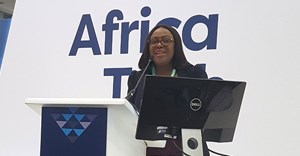#AfricaCom: Mobile advertising - connecting brands to their customers

Umeh presented at the Connectivity Stage on Tuesday, 7 November and explored the peculiarities of the African market, the pain points of the modern marketer and where the true value lies with regards to mobile advertising.
He started his talk with a bold statement; “1.2 billion people on the continent are difficult to find.” Umeh continued and said that there are so many people (potential customers) but we don't know how to reach them, and this is strange because something that everyone has in common, especially in Africa, is a mobile device.
According to Umeh, the quality of connectivity continues to increase on a daily basis. He says with all the apps on our smartphones today, we're getting more and more connected and via those connections, we're getting access to a lot of data. So we need to ask the question, how do we make sense of this data?
Mark Casey, technology, media and telecoms (TMT) industry leader at Deloitte said:
"Owning the hearts, minds, and wallets of consumers is the end goal. Will telcos, who have laid the foundation for connectivity and access, be the winners; or will it be global technology groups, the banks, media, advertisers or retailer giants?"
Umeh says 70% of the connections currently on the continent are still not on the internet, and 50% of those people who have smartphones are also not connected to the internet. So how do we reach those individuals? Are we going to wait until everyone is connected? He says his company, the Terragon Group, has envisioned that about half of the 500 million connections that we have on the continent will be on the internet by 2020. However, people who are not connected via the internet are still on mobile networks exchanging valuable information that can be useful to a lot of African brands and businesses.
For the last six or seven years, Umeh and his company have been driving data monetisation and mobile advertising for many of these brands through a company called Twinpine. Through this, they have realised that copying and pasting the European or American business model for mobile advertising will not work in Africa. The scale of the kind of businesses that they can build via mobile advertising will not happen if they use those models. “Because Africans use the mobile phone in a very different way,” he says.
Utilise push elements from non-web channels
In Africa, people check their USSD, they check their account balance at least five times a day and only 4% of the connections on the continent are post-paid. So we need to start leveraging how Africans use the phone and make sense of that information. For example, after every call, end-of-call notifications and account balances are sent to users – these are all push notifications that Africans receive and it's super useful to them – but is there something else that we can use that channel for?
Umeh says they found that to reach Africans, they can continue to use the internet because the internet will continue to grow its dominance in Africa. However, he says non-web channels (SMS, USSD services) should not be ignored. He says we need to look at ways that we can start utilising the push elements of the existing pool of channels to the benefit of the African customer. He says that this is where he wants to make the case for mining data.
Challenges faced
- Governments and institutions are unable to accurately plan, fund and evaluate development activities.
- Businesses and brands are unable to effectively connect with their consumers across all socio-economic groups. Umeh says making sense of how people use their devices, both web and non-web, can potentially give these businesses and brands significant advantage over its competitors.
- Exclusion of the larger majority especially from access to finance.
- Redundant digital assets - not being monetised by telcos and other web publishers. Umeh says by using telcos information you can drive significantly more financial inclusion.
Pain points for the modern marketer
- The complexities of using multiple data sources. These can potentially aid the marketer to reach the retail customer.
- Difficulty keeping track of customers across different channels and on different devices. The connectivity that mobile phones and smartphones enable, can help to bridge the gap we have reaching the mobile customer in Africa.
- Turning insights into actionable tactics to drive effective marketing.
- Inability to create a single customer view. Because of the audience pockets, Umeh says they will be able to build by using the data they can mine from how people use their devices. “We will eventually then be able to solve the problem of the single customer view.”
- The dearth of rich user profiles and optimised audience buckets.
What we see today
- Access to mobile will further bridge the financial inclusion gap.
- A paradigm shift from channel focus to audience focus yielding.
So where do the values lie and what is the way forward? Umeh says we need access to the brands and we need access to the telcos agencies, and these types of partnerships are the way forward.



























